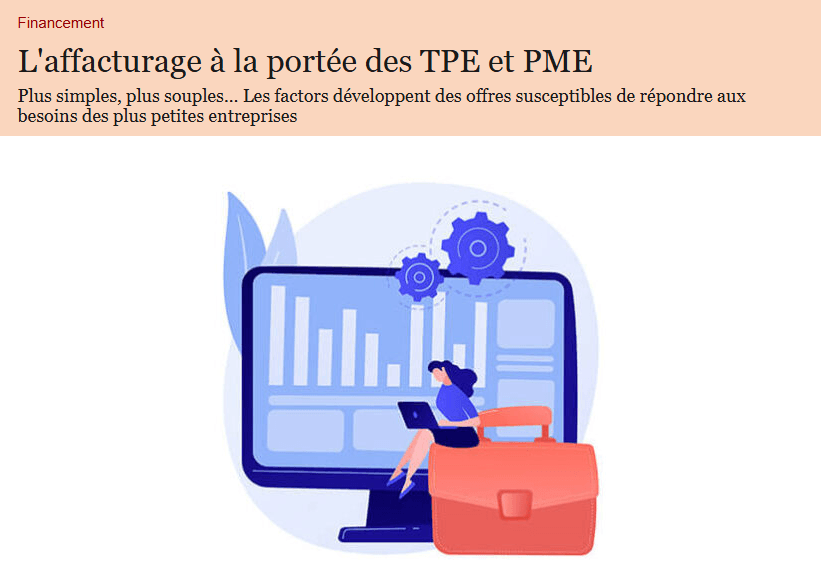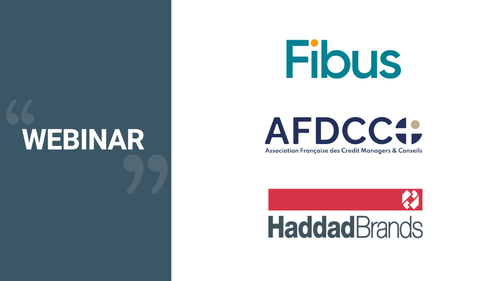Factoring within the reach of VSEs and SMEs
Simpler, more flexible... The factors are developing offers that are likely to meet the needs of the smallest companies. Read the Nouvel Economiste article on simplified factoring offers for very small businesses.


After strong growth in recent years, the factoring market is adapting to a sluggish economic climate and increased competition. Factors are targeting VSEs and SMEs in particular, which until now have been reluctant to use a method of financing that they feared was too complex. New, simpler offers are emerging, sometimes tailor-made or even adapted to new sectors. This is an opportunity for VSEs and SMEs, as factoring is less expensive than an overdraft and makes it possible to secure accounts receivable in a context marked by numerous defaults.
Two vintages outside the norm have just ended on the factoring market, with extremely moderate growth in 2023 and 2024. A cold snap in a sector accustomed to double-digit growth. As the leading short-term financing option for companies in France, factoring consists of selling invoices to a specialised company to speed up their collection. This world of financing has become widespread over the last ten years, increasing from nearly 200 billion euros of invoice repurchase in 2013 to 432 billion in 2023. Today, factoring is aimed at both CAC 40 companies and ‘around the corner’ professionals for the financing of inter-company receivables.
Two vintages outside the norm have just ended on the factoring market, with extremely moderate growth in 2023 and 2024. A cold snap in a sector accustomed to double-digit growth. As the leading short-term financing option for companies in France, factoring consists of selling invoices to a specialised company to speed up their collection. This world of financing has become widespread over the last ten years, increasing from nearly 200 billion euros of invoice repurchase in 2013 to 432 billion in 2023. Today, factoring is aimed at both CAC 40 companies and ‘around the corner’ professionals for the financing of inter-company receivables.
"While some activities have remained dynamic, particularly international factoring, competition is intensifying in a landscape dominated by the major banking networks."
While some activities have remained dynamic, particularly international factoring, competition is intensifying in a landscape dominated by the major banking networks. ‘In 2024, the number of calls for tenders has increased. Mid-sized companies and large groups have re-evaluated their short-term solutions,’ says Marc Bonnemains, Deputy Managing Director of BPCE Factor.
In a context marked by 66,000 business failures, factors are positioning themselves with new offers, designed to retain their customers or attract new ones. They aim to enable companies to increase their cash flow and quickly obtain a new line of financing, while factoring proves to be less expensive than a bank overdraft. Factors are looking for new growth drivers and the martingale to meet the needs of VSEs and SMEs. There are still companies to be ‘converted’ to this method of financing, particularly prospects who, because of their size or sector of activity, have traditionally been excluded.
In a context marked by 66,000 business failures, factors are positioning themselves with new offers, designed to retain their customers or attract new ones. They aim to enable companies to increase their cash flow and quickly obtain a new line of financing, while factoring proves to be less expensive than a bank overdraft. Factors are looking for new growth drivers and the martingale to meet the needs of VSEs and SMEs. There are still companies to be ‘converted’ to this method of financing, particularly prospects who, because of their size or sector of activity, have traditionally been excluded.
Simplified factoring offers for very small businesses
While medium-sized companies are generally well ‘equipped’, very small companies often prefer to turn to their local banking network. Small companies that do not have support functions still find it difficult to use factoring, which is ‘still considered a complex product, even by some accountants,’ explains Olivier Lène, deputy director of the key accounts department at Factofrance. The company has just launched a simplified offer dedicated to very small businesses. It aims to facilitate the implementation of the factoring contract, to make the associated accounting entries more understandable, and allows up to 100% of the receivable to be financed, without the 10% guarantee fund normally deducted.
"Another financing facility that is particularly aimed at small businesses is ‘one-off mobilisations’ that are slowly arriving on the market."
Another financing facility that is particularly aimed at small businesses is ‘one-off mobilisations’, which are slowly arriving on the market. The offer deployed by Société Générale Factoring now allows companies to assign only part of the invoices of a single customer. ‘We have gone back on the requirement to ask for all the invoices of a given buyer to be entrusted to us, to enable the company to mobilise any invoice from its customer as and when needed’, explains Philippe Pougeard, its Deputy Managing Director, who believes that the introduction of electronic invoicing and the implementation of partner dematerialisation platforms (PDP) should increase the use of factoring.
Another new development deployed by BPCE Factor is Flash Facture, a digital offering aimed at VSEs and SMEs. It allows them to quickly obtain liquidity for one-off rather than necessarily recurring needs. ‘When, for example, a small business has just won a contract with a client for the first time, it is only paid between 60 and 90 days later. Cash is the lifeblood of business,’ emphasises Marc Bonnemains of BPCE Factor, who has also just launched a factoring product with the Banque de l'Orme aimed at companies in a period of observation.
Another new development deployed by BPCE Factor is Flash Facture, a digital offering aimed at VSEs and SMEs. It allows them to quickly obtain liquidity for one-off rather than necessarily recurring needs. ‘When, for example, a small business has just won a contract with a client for the first time, it is only paid between 60 and 90 days later. Cash is the lifeblood of business,’ emphasises Marc Bonnemains of BPCE Factor, who has also just launched a factoring product with the Banque de l'Orme aimed at companies in a period of observation.
New sectors and the ‘CSR discount’
Some factors also invest in sectors of activity that have long been excluded from the use of factoring, such as real estate, construction or car dealerships. Operating in these areas requires expertise and the ability to process non-final invoices. Construction sites, for example, generate particular risks. ‘We have a good knowledge of how to manage these markets with multiple situations, which allows us to follow them in a secure way,’ explains Marc Balaguer, commercial director of BNP Paribas Factor, which opened up factoring to construction companies more than twenty years ago and now offers this service to VSEs.
Other innovations, this time targeting companies and organisations of all sizes: preferential pricing conditions for those committed to improving their carbon footprint. A kind of CSR discount. ‘These offers are aimed at companies that already have measurement criteria and rely on external auditing firms. Penalty and bonus systems apply to the pricing of the contract,’ explains Christophe Jouan, key account consultant at the broker Fibus.
Some banks have extended this option to companies without evaluation criteria, often SMEs. ‘In this configuration, it is the factor who assists the company in the selection of these indicators,’ adds Christophe Jouan. Crédit Mutuel, through its subsidiary Factofrance, is considering this possibility. ‘We could imagine having a partner rate the quality of the client portfolio in terms of ESG, and relaxing certain criteria of the factoring contract if the portfolio rating is good,‘ notes Olivier Lène, its Deputy Director of Key Accounts. A little extra incentive that is part of the banks’ CSR policies.
Other innovations, this time targeting companies and organisations of all sizes: preferential pricing conditions for those committed to improving their carbon footprint. A kind of CSR discount. ‘These offers are aimed at companies that already have measurement criteria and rely on external auditing firms. Penalty and bonus systems apply to the pricing of the contract,’ explains Christophe Jouan, key account consultant at the broker Fibus.
Some banks have extended this option to companies without evaluation criteria, often SMEs. ‘In this configuration, it is the factor who assists the company in the selection of these indicators,’ adds Christophe Jouan. Crédit Mutuel, through its subsidiary Factofrance, is considering this possibility. ‘We could imagine having a partner rate the quality of the client portfolio in terms of ESG, and relaxing certain criteria of the factoring contract if the portfolio rating is good,‘ notes Olivier Lène, its Deputy Director of Key Accounts. A little extra incentive that is part of the banks’ CSR policies.
3 questions to... Romain Chaufour, development director at Fibus
How does factoring fit into an increasingly complex international economic environment?
Factoring is a form of financing that adapts to all situations: supporting the growth of a company, or helping it when its financial situation deteriorates. It can be set up for all or part of its activity, in France and internationally. French factors are the most dynamic in Europe and able to deploy lines of financing in a large number of countries. We observe that in these more complex times, factoring is progressing everywhere in Europe, particularly in Germany. By transforming customer receivables, i.e. almost two months of turnover, into immediately available cash, it secures the financing of operations. It is a highly reliable form of financing, more so than bank overdrafts or Dailly. We see in some companies in amicable proceedings that the presence and maintenance of a factoring programme reassures the creditors around the table; it is a guarantee of trust.How has the Fibus group innovated by bringing a consulting and software offering to the market?
At Fibus, we strongly believe in the digitisation of services. In addition to our traditional business, which has been in existence for 20 years, we bought a software company six years ago. We have developed it to help finance teams manage their factoring and credit insurance operations. This tool makes it very easy, for example, to justify customer balance differences, identify unused additional funding pockets, or provide finance departments with a consolidated dashboard. This is very useful when there are different contracts, different entities, and different countries involved in factoring programmes. This digital solution is a strong differentiating factor in our market, which has not seen many technical developments for several years. Fibus is investing heavily in this offer, which meets the needs of finance departments, particularly in terms of saving time, improving operations and optimising financing programmes.What are your challenges and objectives for the coming year?
Fibus will continue to expand internationally. We opened an office in Frankfurt at the end of the year to accelerate our development in Germany. One of our specialities is supporting companies undergoing LBOs. After a few years at half-mast, we expect to see a return of attractive deals on the market in 2025 and growth opportunities, particularly with European mid-caps owned or bought out by investment funds.Factoring or securitisation: the clash of the giants
A few years ago, it was rare for a factoring programme to compete with a securitisation line. ‘It is now commonplace in the calls for tenders of large companies, including those listed on the CAC 40 index,’ notes Olivier Lène, deputy director of key accounts at Factofrance.
These two solutions share the same objective of financing a company. But unlike factoring, securitisation is not just about invoices. It can be used to finance many other things: long-term receivables, consumer credit, credit card receivables, etc. ‘These two solutions coexisted for years without ever crossing paths, and factoring grew significantly. It ended up taking market share from securitisation when factors started to carry out large-scale international operations about ten years ago,’ reports Gaëtan du Halgouët, CEO of the broker Fibus.
So what are the differences? Factoring is a bilateral contract between a company and a factor. Securitisation requires more stakeholders: the company (the assignor), the arranger, the manager, the rating agency and the investors who will buy the issued securities. This involves creating an ad hoc legal vehicle (or Special Purpose Vehicle or SPV). Factoring is therefore faster and often less expensive. But not all companies have access to it, such as this large French group which has to turn to securitisation due to its financial restructuring. ‘In this specific case, its price is three times higher than that of factoring,’ says Gaëtan du Halgouët. But for a well-rated group with a large and well-distributed customer portfolio, securitisation can be more attractive than factoring. ‘Securitisation is mainly aimed at large international companies with a large volume of customers and invoices. The risk is thus highly mutualised,’ emphasises Gaëtan du Halgouët.
These two solutions share the same objective of financing a company. But unlike factoring, securitisation is not just about invoices. It can be used to finance many other things: long-term receivables, consumer credit, credit card receivables, etc. ‘These two solutions coexisted for years without ever crossing paths, and factoring grew significantly. It ended up taking market share from securitisation when factors started to carry out large-scale international operations about ten years ago,’ reports Gaëtan du Halgouët, CEO of the broker Fibus.
So what are the differences? Factoring is a bilateral contract between a company and a factor. Securitisation requires more stakeholders: the company (the assignor), the arranger, the manager, the rating agency and the investors who will buy the issued securities. This involves creating an ad hoc legal vehicle (or Special Purpose Vehicle or SPV). Factoring is therefore faster and often less expensive. But not all companies have access to it, such as this large French group which has to turn to securitisation due to its financial restructuring. ‘In this specific case, its price is three times higher than that of factoring,’ says Gaëtan du Halgouët. But for a well-rated group with a large and well-distributed customer portfolio, securitisation can be more attractive than factoring. ‘Securitisation is mainly aimed at large international companies with a large volume of customers and invoices. The risk is thus highly mutualised,’ emphasises Gaëtan du Halgouët.
These articles may interest you

How the Credit Manager safeguards the company’s cash flow
A function at the heart of financial stability The Credit Manager’s role extends far beyond preventing bad debt: today, they act as the true conductor of the order-to-cash process, ensuring the company maintains healthy, predictable, and actively managed cash flow. We
spoke with Thibaut Robet, CEO of Fibus, a firm specialising in order-to-cash management.
spoke with Thibaut Robet, CEO of Fibus, a firm specialising in order-to-cash management.

How can credit insurance support growth in a sector under pressure?
Economic difficulties are mounting and weighing more heavily on certain sectors: how can you make the Credit Manager a business partner who supports the company's growth? Discover the testimony of HADDAD BRANDS EUROPE in the webinar hosted by Alexia Monteillet, Credit Risk Manager at HADDAD BRANDS EUROPE, and Marc Chaquès, Credit Insurance Director at Fibus, in partnership with the AFDCC.

Factoring for LBO transactions
Deconsolidating, uncapped, quick to set up and inexpensive, factoring is the perfect financing solution to support the growth of LBO-backed companies.
- For 20 years, Fibus has been supporting private equity funds in France, the UK, Germany and the US.
- Four out of five transactions carried out for LBO-backed companies.
Contact us, so that, together, we can find the best solution for financing your accounts receivable.
Write us
